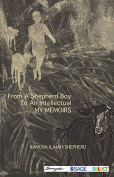Where Epics Fail: Meditations to Live By by Yahia Lababidi
 London. Unbound. 2018. 256 pages.
London. Unbound. 2018. 256 pages.
Yahia Lababidi has done something at once anachronistic and deeply contemporary with Where Epics Fail, his wide-ranging collection of aphorisms. The book is anachronistic in the sense that such compendiums of musings tend to be thought of as decidedly old-fashioned nowadays—the wise master dropping his pearls of wisdom to the unwashed masses would strike many as haughty and pretentious in 2019. In his subtle subversion of the genre, Lababidi deftly links the old tradition to modern sensibilities.
While Lababidi shares a profound connection with the great Sufi mystics and their penchant for aphoristic writing, his voice is unique, deeply modern, and steeped with a warm sense of humor. Rather than rehashing the tropes of mysticism with an occasional mention of new technology, Lababidi weaves his spiritual thread into the very fabric of contemporary life, extracting insightful lessons as much from airline travel and tourism as from ideas about the nature of art or God.
Many of his aphorisms would not seem out of place on your particularly witty friend’s social media channel, and indeed, Lababidi devotes several pages to aphorisms specifically about how society is adapting to these new platforms of communication. “Before Twitter, hardly anyone knew what an aphorism was. After Twitter, almost everyone suspects they are an aphorist.” As pithy as these two sentences seem to be, their subtext brings up all sorts of questions about the effects of social media on the individual and how society has changed with the advent of this new medium.
That said, it is obvious from the onset that Lababidi’s predominant concerns are spiritual and artistic, particularly the intersections of the two. Many of the aphorisms lament the modern world’s spiritual state, which he sees as decidedly threadbare, and how society has shifted from seeing art as a higher calling to relegating it to just another marketable product. Lababidi frequently exhorts his readers to look back to childhood as a map to spiritual growth: “Childhood imagination exercises, such as cloud-gazing, might become spiritual disciplines if carried over to adulthood.” Regaining the openness, suppleness, and wonder of a child’s mind is a common theme throughout mystic literature, from Christian monks to Zen masters, Sufi teachers to Taoist sages. Dedicating a good portion of the book to such ideas, Lababidi certainly shows that his mysticism runs far deeper than any tweet.
How to properly read a collection like Where Epics Fail is a bit of a task in itself. On one hand, simply reading the book cover to cover allows you to see Lababidi develop his thoughts on various topics, almost as if you were reading his journal. This method provides some interesting perspective, but it can also leave you feeling a bit disjointed, as each self-contained thought begins to pile up into an unwieldy whole. On the other hand, Where Epics Fail is exactly the kind of book that could be picked up each morning and opened at random to provide the reader with a meditation for the day. While Lababidi covers a wide range of topics, he also provides many subtle variations and different perspectives on the same subject. The insights that one aphorism might uncover could be completely deflated in the one that follows. Reading the book slowly and deliberately, holding each aphorism in mind, and remaining open to Lababidi’s shifting perspectives could indeed make Where Epics Fail a new mystic manual for our hectic lives.
Z. McGrew
University of Science and Arts of Oklahoma
















































